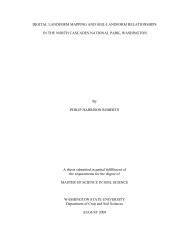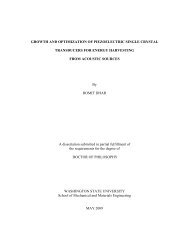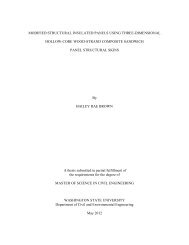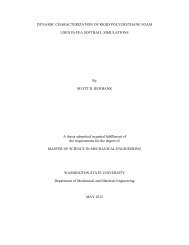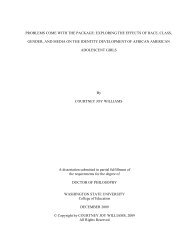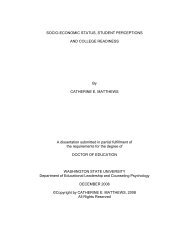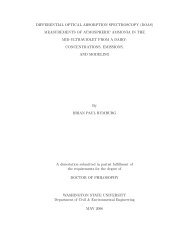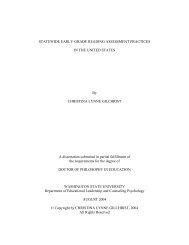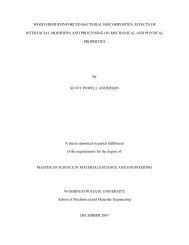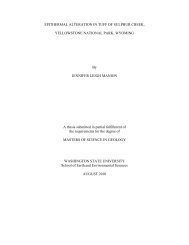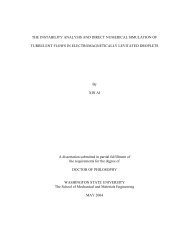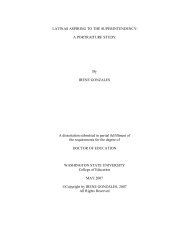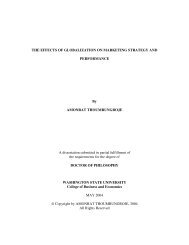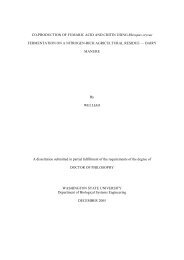the moral reasoning of student athletes and athletic training students
the moral reasoning of student athletes and athletic training students
the moral reasoning of student athletes and athletic training students
Create successful ePaper yourself
Turn your PDF publications into a flip-book with our unique Google optimized e-Paper software.
use <strong>the</strong>ir judgment in discriminating between which methods <strong>of</strong> doping <strong>the</strong>y will or will not use.<br />
If all <strong>athletes</strong> are unrestricted by regulations, <strong>the</strong>n everyone will have an equal opportunity <strong>and</strong><br />
sport will be fair again (Savulescu, Foddy, & Clayton, 2004). This argument raises many <strong>moral</strong><br />
questions. Consider <strong>the</strong> following scenario: an elite athlete has trained hard for many years, made<br />
sacrifices in his or her personal, social <strong>and</strong> educational careers. This athlete has found <strong>the</strong><br />
optimal combination <strong>of</strong> natural ability, intense discipline, <strong>training</strong> <strong>and</strong> commitment. Suddenly<br />
this athlete recognizes that his or her competitors have an added advantage in <strong>the</strong>ir willingness to<br />
practice doping. The athlete now has two options: (1) face <strong>the</strong> competition with a potentially<br />
significant disadvantage given to o<strong>the</strong>r competitors in <strong>the</strong> form <strong>of</strong> doping or (2) choose to engage<br />
in <strong>the</strong> practice as well in an effort to remain competitive (Catlin & Murray, 1996).<br />
“One athlete’s decision to use performance-enhancing drugs exerts a<br />
powerful effect on <strong>the</strong> o<strong>the</strong>r <strong>athletes</strong> in <strong>the</strong> competition. The athlete<br />
remains free to choose whe<strong>the</strong>r or not to violate <strong>the</strong> rules <strong>of</strong> <strong>the</strong> sport as<br />
<strong>the</strong>ir competitors are doing, but is not free to pursue his or her great dream<br />
with confidence that <strong>the</strong> best athlete will win.” Catlin & Murray (1996, p.<br />
237)<br />
Thus, in order to remain competitive <strong>the</strong> athlete may be placed in an unfair position where he or<br />
she feels coerced to take performance enhancing drugs.<br />
Because few studies have been conducted with <strong>athletic</strong> <strong>training</strong> <strong>student</strong>s, this study has<br />
<strong>the</strong> potential to add to <strong>the</strong> body <strong>of</strong> knowledge not only about <strong>the</strong> <strong>moral</strong> <strong>reasoning</strong> <strong>of</strong> <strong>athletes</strong> <strong>and</strong><br />
<strong>athletic</strong> <strong>training</strong> <strong>student</strong>s but <strong>the</strong> relationship <strong>of</strong> <strong>moral</strong> <strong>reasoning</strong> relative to higher education <strong>and</strong><br />
intercollegiate sports character development mission. Thus, <strong>the</strong> goal <strong>of</strong> this study is to examine<br />
<strong>the</strong> general <strong>moral</strong> <strong>reasoning</strong> <strong>of</strong> <strong>student</strong> <strong>athletes</strong> <strong>and</strong> <strong>athletic</strong> <strong>training</strong> <strong>student</strong>s when faced with<br />
45



